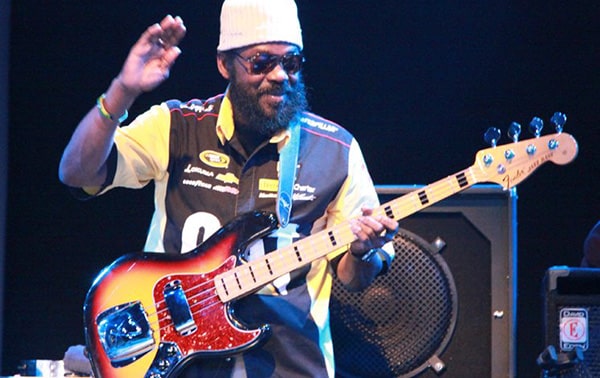
Conrad Buedel / Tahoe Onstage
Some music is timeless. The songs of Grateful Dead, classic rock from the 1970s and Jimi Hendrix are heard as much today as when they were new. The same is true for Bob Marley and The Wailers.
“The music, it is for all ages and it is for all times, for past, present and the future,” said Aston “Family Man” Barrett, the remaining member of the Wailers. “It’s like the moon. The older the moon, the brighter it shines.”
The Wailers are on tour, celebrating the 40th anniversary of “Survival,” the 11th and penultimate Bob Marley album.
Barrett, 72, was the band’s bass player when it was first known simply as The Wailers. In 1974, after the fourth album, “Burnin,’” Peter Tosh and Bunny Wailer left the group, which took on the name “Bob Marley and The Wailers.”
While every album by Bob Marley and The Wailers can be considered a classic, “Survival” stands out because its such a contrast to the previous album, “Kaya,” the band’s 10th record. “Kaya” was a mellow homage to the Rastafarian sacrament, ganga (marijuana). “Survival” had a message of unity and social unjustice.
“How can you be sitting there
Telling me that you care;
When every time I look around,
The people suffer in the suffering
In every way, in everywhere.”

The album’s artwork featured the flags of 48 African countries, plus that of Papua New Guinea. It was recorded at Tuff Gong Recording Studio in Kingston, Jamaica. It was released Oct. 2, 1979. Along with Marley and Barrett, the band included lead guitarist Junior Marvin and the I Three singers, Rita Marley, Marcia Griffiths and Judy Mowatt.
Each of the album’s songs will be performed in The Wailers’ opening set: “So Much Trouble in the World,” “Zimbabwe,” “Top Rankin,” “Babylon System,” Survival,” “Africa Unite,” “One Drop,” “Ride Natty Ride,” “Ambush in the Night” and “Wake Up and Live”
The show on the tour, which will stop Saturday, June 29, at the Crystal Bay Casino, will continue with more songs from the Bob Marley and The Wailers’ library.
Reggae became famous and everlasting by Bob Marley and The Wailers. The style evolved from Jamaica from mento, to rocksteady to ska to reggae.
In an interview with Tahoe Onstage in 2014, Barrett called the pioneering sound “roots, culture and reality.” It was inspired, he said, by rhythm and blues music of the United Kingdom, meringue, samba and United States soul music. Specifically, he cited James Brown, the Jackson 5, the Drifters, the Impressions and the Chi-Lites.
“We love all types of music,” he said. “We used to say, ‘What is the height of music? Is it symphony? Is it classical?’ … Then we realize the height of music is jazz. So, we said, ‘Let’s analyze jazz and see what it’s all about.’ And it was free form music.”
He recalled how the band came together becoming popular in the United Kingdom before it caught fire in the United States.
“I am the one who put the band together, you know,” he said. “I said, ‘Bob, you are going to play rhythm and sing lead, and Peter, you are going to play lead guitar and sing harmonies and sometimes lead, and Bunny (Wailer) Livingstone, he played percussion, harmony and sometimes lead. And that is in when we move off in ’72; then I have Earl “Wire” Lindo as my keyboard player.
“And we hit a club in London called The Speak Easy. We did two shows a night for two weeks and when we finish the write up in the paper is that on the first song we played we cast a spell and then after that it was like magic.”
The magic continued even without Wailer and Tosh, whose song “Stop that Train” was a metaphor to his exit from the Wailers.
The band was reconfigured as Bob Marley and The Wailers until Marley’s death in 1981. Along with respect and play time on Album-Oriented-Rock radio stations in the 1970s, Marley even helped bring reggae music to Top 40 AM stations popular at the time.
“We came up with a new concept of music,” Barrett said. “New music, new melodies and that’s how we came up with the album ‘Natty Dread.’ ”
Today’s Wailers include Barrett, his son Aston Barrett Jr. on drums, Donald Kinsey on lead guitar, Josh Barrett on lead vocals, Owen “Dreadie” Reid on rhythm guitar, Junior Jazz on guitar, Andres I Pez Lopez on keyboards, Glen Dacosta on saxophone and Shema McGregor (Judy Mowatt’s daughter) on vocals.
— Tim Parsons
- The Wailers
Perform 40th anniversary of ‘Survival,’ plus a second set of classics
When: 9 p.m. Saturday, June 29
Where: Crystal Bay Casino Crown Room
Tickets: $25 in advance or $30 at the door
Red Room after-party: The Umpires
